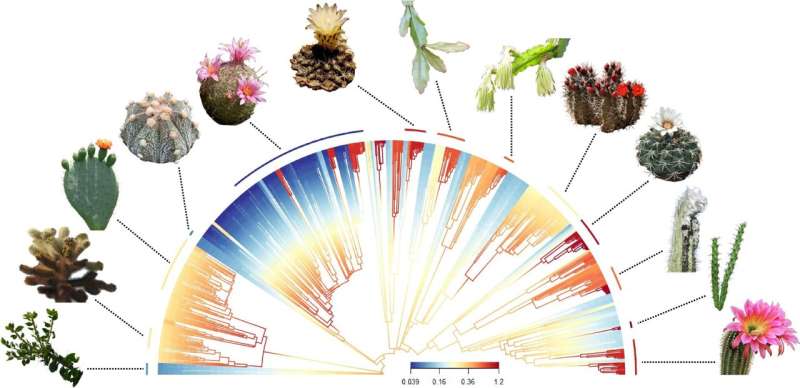
Cacti are among the most diverse plants, from the giant saguaro cactus that can grow up to 18 meters in height, all the way down to the tiny button cactus which is a few centimeters tall. A new study by the Milner Centre for Evolution at the University of Bath has shed light on the mystery as to why there are so many different types.
The work is published in the journal Nature Communications.
Previously, it had been thought that the dryness of the climate played an important role in cactus diversity, but the researchers found this not to be the case. The new study found that temperature range during the day, sand content in the soil and seasonal changes are the biggest drivers of evolution.
While they are popular house plants across the world, cacti are only native to North, Central and South America, with the highest species richness being found in Mexico.
Researchers pieced together all known published data on cacti to better understand the driving forces behind the huge diversity of cacti species found today and built the biggest ever evolutionary tree for cacti using thousands of DNA sequences.
The team looked at a large number of biological variables, such as plant size, soil sand content, geographical range, aridity and diurnal temperature range (the minimum and maximum temperatures experienced over 24 hours). They correlated this data with biodiversity and rates of evolution of new species.
They used machine learning methods to model the interactions between several variables simultaneously, then validated the results using traditional evolutionary methods.
Surprisingly, they found that while the highest number of species was found in Mexico, the country also had the lowest evolution rates of new species (speciation).
Aridity was previously assumed to be a driving factor in their evolution, but the new study points to the diurnal temperature range, sand content in the soil and seasonality as being more important drivers of evolution.
First author Dr. Jamie Thompson did the research while at the Milner Centre for Evolution in the Department of Life Sciences at the University of Bath, and now is a Lecturer at the University of Reading.
He said, “Cacti are a really interesting, diverse family of plants that have evolved relatively recently in evolutionary time to live in a wide range of environments across the American continents. People think they are very hardy because they are able to live in such extreme climates, but in fact they are more at risk of extinction than other types of plants.
“Because there is the highest biodiversity in Mexico, it was assumed this was because the conditions there were best for evolution of species. However, our study shows this isn’t the case—instead, Mexico has the slowest rate of speciation but has lots of biodiversity because the extinction rates are slower. In other words, the Mexican climate is not necessarily better at producing new species, but good at preserving existing ones.”
Dr. Nick Priest, Lecturer from the Milner Centre for Evolution in the Department of Life Sciences at the University of Bath, said, “Our work shows that cacti are not as successful as we thought, and are more vulnerable to climate change. This is concerning—if cacti can’t thrive in our changing climate, what chance do other plants have?”
More information:
Jamie B. Thompson et al, Identifying the multiple drivers of cactus diversification, Nature Communications (2024). DOI: 10.1038/s41467-024-51666-2
Provided by
University of Bath
Citation:
From smooth and button-size to spiky and giant-size, why are cacti so diverse? (2024, August 28)
retrieved 28 August 2024
from https://phys.org/news/2024-08-smooth-button-size-spiky-giant.html
This document is subject to copyright. Apart from any fair dealing for the purpose of private study or research, no
part may be reproduced without the written permission. The content is provided for information purposes only.
